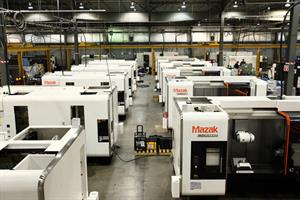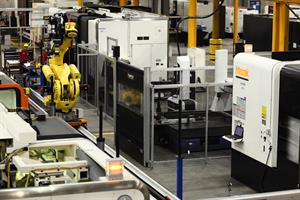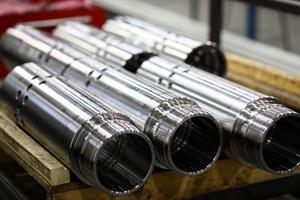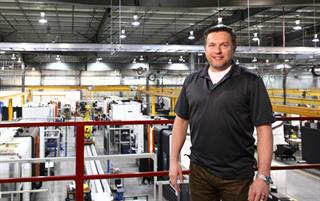
Only a few short years ago, automation was somewhat scarce within much ofthe manufacturing operations at GN Corporations Inc., in Airdrie, Alberta. But the shop, driven by a strong forward-thinking attitude of continuous improvement, recently made a strategic automation leap to further increase productivity and ensure its global competitiveness well into the future.
GN provides the oil and gas industry equipment precision machined to customer specifications as well as produces its own line of standard products for the sector. And, according to GN Corporations Inc. President and CEO John Pleša, the fluctuations and intense competition within this industry can be a real challenge.
“Competing in North America is challenging, but when done on a global scale, shops start pitting themselves up against low-cost manufacturing countries such as China, India and Mexico. And, when doing so, a shop had better be 20 to 30 percent more productive than the rest of the world,” warned Pleša. “This will allow a shop to compete when it comes to delivery times. However, they still have to beat out the competition on price. For us, automation has proven a major factor in achieving both of those critical objectives.”
At the heart of GN’s machining operations are about 60 Mazak machine tools. Of those, 14 are new and part of two completely automated machining cells GN refers to as its “Pioneer” and “Frontier” lines.
The two cells – each consisting of advanced multi-tasking machine technology and standalone robotics – have helped boost part consistency and increase production output significantly. As a result, GN successfully competes within and quickly adjusts to the challenging and ever-fluctuating North American and global oil and gas industry sectors.
Four Mazak INTEGREX e-500 Multi-Tasking Machines set the foundation for the Pioneer line that typically handles the production of long, shaft-type workpieces. These advanced machines feature turning and milling spindles for single setup operations as well as fully programmable tailstocks in support of secure and accurate operations.

The 10 Mazak INTEGREX i-200ST Multi-Tasking Machines within the Frontier line feature two turning spindles, a milling spindle and lower turret that afford GN efficient DONE IN ONE® part processing production.
The machines also sport Mazak’s new SmoothX CNC that provides the shopthe shortest possible machining cycle times, especially in fine increment programs for simultaneous 5-axis operations. The control incorporates a wide variety of advanced programming functions for ease of use and high-speed, high-accuracy machining performance.
Other Mazak machines at GN include QUICK TURN NEXUS 450-II MY Multi-Tasking Machines with live milling spindles and Y-axis machining capabilities; INTEGREX i-400ST Multi-Tasking Machines, each with two turning spindles and lower turrets; and a Mazak CYBERTECH TURN 5500 with a 15" spindle bore and maximum part diameter machining capacity of 32".“Much like us, Mazak continuously evolves. They’ve advanced from simple 2-axis lathes and 3-axis milling machines into multi-tasking machines, automation and digital connectivity,” said Pleša. “One of the key features that sold us on the Mazaks is that the machine technology easily integrates with automation.”All the parts GN machines play a critical role while in use, so much so any part failure can lead to catastrophic outcomes in the field. This is why the shop operates under a “zero defects” initiative because there can be no bad parts. And according to Pleša, automation provides the processing consistency necessary to maintain such an initiative.Most components are made from 4140 and 4340 heat-treated steels as well as from some exotics such as Inconel, magnesium and others unique to the industry. Tolerances can range from +/-0.015" to as tight as +/-0.0005 ", depending on part complexity.According to Chamith Rathnayake, Lean Manufacturing Manager at GN Corporations Inc., the shop focuses heavily on lean manufacturing and adhering to strict part-processing standards and practices.
“For us, it is not about the number of parts going out the door, per se,” said Rathnayake. “Instead our goal is to meet the specifications set for each and every one of the parts we produce. We calculate and determine all aspects of a job – from cost per part to tolerances and machining processes. And fulfilling all those set requirements ultimately results in parts produced and delivered in the shortest amount of time possible.”
For every one of its components, GN marks and tracks them from start to finish. Any defects can then be quickly traced back to who manufactured the part, measured it, crated it and even shipped it – all down to the day and time to ensure the error never again happens.
Both the Pioneer and Frontier cells improve upon part setup and cycle times while also providing additional lights-out production capacity at GN. But what is most critical for the shop is that the cells basically eliminate any necessary human intervention within the process, which greatly diminishes the chance for errors and deviation from one part to the next.
GN gave the Pioneer cell its name mainly because it is a completely new approach to manufacturing oil and gas industry equipment for which it is used. The cell was also the company’s first/pioneering venture into a major automation project.
The four Mazaks in the Pioneer cell double GN’s production capability byproviding the output of eight of the shop’s other non-automated machines running 24/7. This cell also reduces labor requirements by 75 percent. The Pioneer operates three shifts, five days a week and typically for eight hours or more at a time without any human intervention.
All the necessary machining, gauging/quality control (QC) and deburring of parts happens within the Pioneer cell. Because the four Mazaks are multi-tasking machines, they allow GN to complete the parts in one setup and two operations. Plus, if needed, the shop can quickly and easily switch the whole cell over to run a different family of parts.
Adam Jarantowski, Head of Manufacturing at GN Corporations Inc. and the lead in the Pioneer line project, said that it was a challenge to automate the particular part processing operations of the cell – mainly because the parts and the machining they require are very complex.
“To automate the processes and machine parts in as few operations as possible definitely required multi-tasking machines,” explained Jarantowski. “Without the Mazaks, producing the parts would require a lot more than just four machines as well as several additional operations.”
Pioneer uses two Fanuc robots. One, with a 600-kg capacity, rides on a rail to load and unload the Mazak machines, while the other, a smaller one, works at the part-gauging station. An in-line coordinate measuring machine (CMM) measures parts and feeds the resulting data into the machine tools for on-the-fly offset adjustments, and completed parts from the cell are 100 percent inspected.
Currently, Pioneer processes 4140 heat-treated steel parts that require two operations and two machines; so two parts are completed simultaneously. The cell runs a specific family of parts, and each of the Mazak machines is capable of running any of those variations.

Because GN opted for 160-tool magazines on its INTEGREX e-500s, the shop can load each machine with at least three sets of the same tooling, as well as accommodate boring bars up to 24" long for part diameters as big as 35.5". Redundant tooling allows the cell to run continuous and lights out. Operators are also able to replace worn tools at the back of the machine without interrupting cell operations.
GN uses a presetter and radio frequency identification (RFID) chips/tags for all the Pioneer cell’s tooling. Once a tool is set, its particular information is stored in the tag that the Mazak machines read and use to automatically make the necessary offset adjustments. So, cell production never misses a beat, according to Jarantowski.
Alex David, Manufacturing Associate at GN Corporations Inc., heads the company’s Frontier cell and said that the key to its success is the ability to complete parts in single setups on the Mazaks. The cell runs 24/7 and, for the most part, unmanned with one operator that keeps it supplied with raw material.
Like the Pioneer cell, GN’s fully automated Frontier line also relies on Mazak multi-tasking machine technology. The Frontier name represents its use of special first-of-its-kind multiple-part-loading robot automation. Each of the INTEGREX i-200STs has its own robot that loads and unloads parts and moves them to a CMM for in-process gauging.
The cell’s CMM provides the Mazaks with in-process offset information and checks parts once they are completed. If parts are out of tolerance, they move to Quality Control for evaluation to determine the cause.

Juan Roubaud, Plant Manager at GN Corporations Inc., credits Pleša withfurther strengthening GN’s drive in continuous improvement, especially in regards to advanced manufacturing technology. Roubaud, who has been with GN over 13 years, said that the parts have, over the years, become much more complex. Processing them on standalone turning centers and milling machines has become inefficient and makes for extremely long turnaround times, which, in the spirit of continuous improvement, is why GN first incorporated multi-tasking machine technology. And now, according to Roubaud, continuous improvement is the catalyst to the company’s push for increased automation.
Both Pleša and Roubaud agree that automation, such as that of the Pioneer and Frontier lines, is the next generation of manufacturing. And for GN, Mazak is and will continue to be a strategic supplier.
“Our relationship with Mazak goes back over 20 years,” said Pleša, “and they are an integral factor in the success of GN not only as a partner in machine tool technology but also in automation. And many machine tool suppliers these days tend to fall short in that capacity.”
